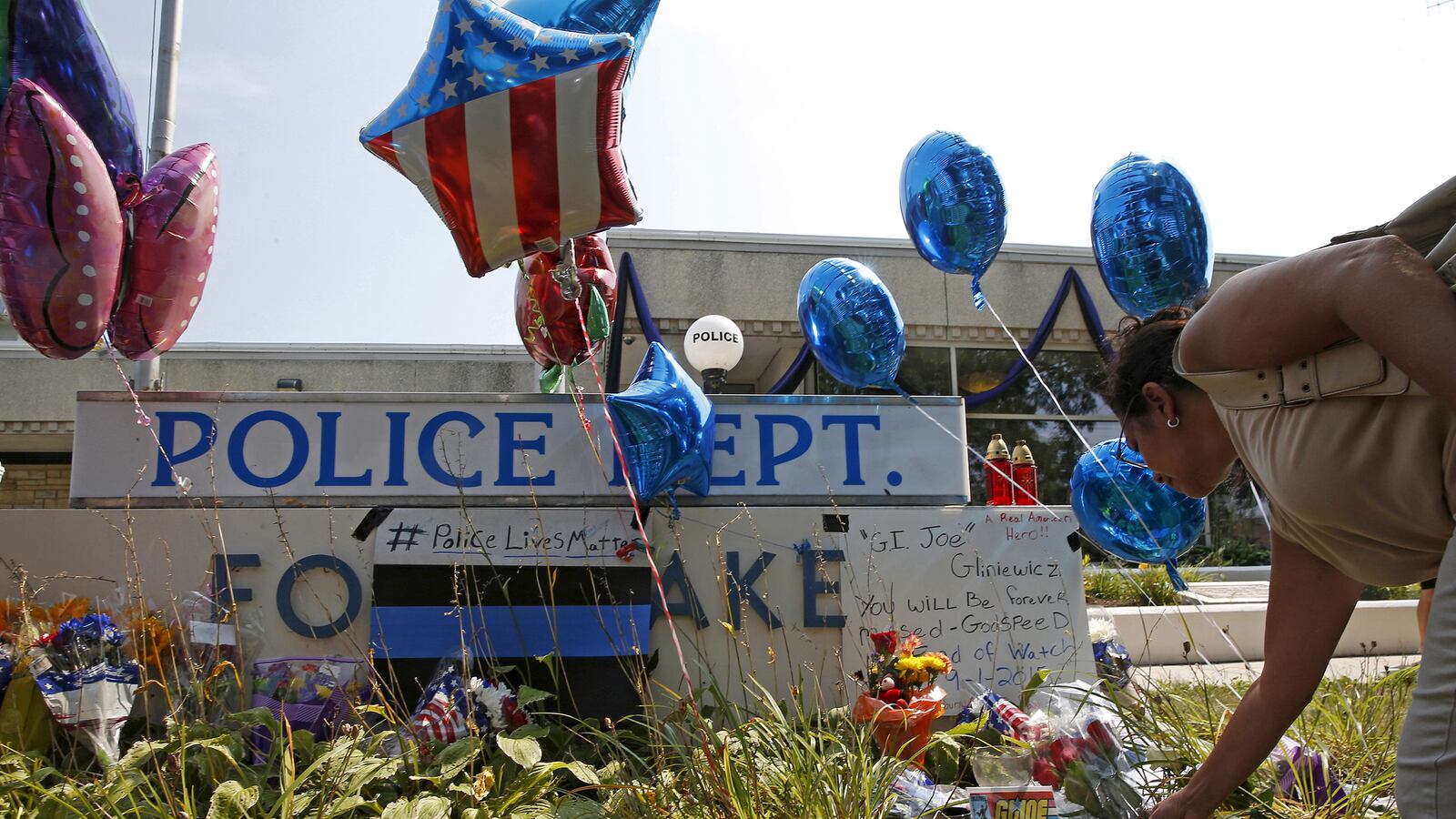FOX LAKE, Ill. — For the past 36 hours in and around the small boating and drinking town of Fox Lake, police have had very little to go on to find the men who killed one of their own.
Their only description of the three men suspected of killing Lieutenant Joe Gliniewicz came from the fallen officer himself.
“Two male white, one male black,” Gliniewicz reported to a dispatcher on his way to work on Tuesday morning. After evidently stopping the allegedly suspicious men, Gliniewicz wound up in the woods, dead from a gunshot wound, possibly from his own weapon.
“Fox Lake unit 6740, checking your status,” the dispatcher called out.
Nothing.
“Fox Lake unit 6740 checking your status.”
Again, nothing. A few minutes later another officer arrived and gave the worst response possible.
“Officer down.”
Police here are being tight-lipped about what happened to Gliniewicz in those woods—perhaps because they know so little themselves. After an initial report that Gliniewicz’s gun was taken by the suspects, one member of law enforcement said it had been found near his body. (George Filenko, commander of the Lake County Major Crime Task Force, declined to confirm that when asked by the Chicago Tribune. )
The area where Gliniewicz died is near an industrial area that includes a concrete plant. Why three men would have been walking there—not exactly close to homes or apartments—is somewhat bizarre. Perhaps the fresh graffiti tags at the plant were from them, maybe they were stealing scrap metal, or they could have been clearly drunk or high walking in the roadway.
All we know is “Two male white, one male black.”
No one even knows why Gliniewicz went after the men--without assistance, into the woods--in the first place.
Then again he was known as GI Joe, and GI Joe doesn’t wait for backup.
Fox Lake and surrounding towns provide ample room to get away, especially with a head start. (The three suspects had about 10 minutes before another officer arrived.) The area is a labyrinth of winding roads, swamps, woods, lakes big and small, neighborhoods, and strip malls.
The combination of impossibly vague suspect descriptions and Lake County’s chaotic terrain were apparently enough for the three alleged cop killers to evade capture. Police officially suspended the search on Wednesday morning, believing the men were long gone.
Gliniewicz’s death briefly became the subject of debate among some. Was this a purposeful killing? Are those protesting police brutality somehow to blame? Has Black Lives Matter somehow created a feverish anti-police sentiment?
For the cops gathered at Lakefront Park, not to mention Gliniewicz’s widow and his four sons, those questions are secondary to the answers they seek in the 32-year police veteran’s death. Maybe there is a political angle—a stunning and disturbing narrative that will help us all sleep at night because it answers the one question no one but a killer can when wondering why men take the lives of other men: Why?
The frustration for lack of answers could be seen on every one of the hundreds of cops who attended a vigil for Gliniewicz on Wednesday night. With the backdrop of an American flag, the cop’s widow stood on a dias and addressed those gathered in front of her with a shaken voice.
“Joe was my hero and my best friend for the past 26½ years,” Mel Gliniewicz said.
The crowd dutifully obeyed a call to thank the officers and other emergency responders around them—a scene of the support for law enforcement, firefighters and paramedics that consumed America following 9/11, but only in miniature.
After the vigil, Gliniewicz’s sons hugged well-wishers with tear-soaked eyes.
“You’re the man now,” one man told the oldest boy, already balding in the same pattern as his late father’s hair faded.
After a lengthy visit with members of the community, a motorcade of police cars prepared to leave as the sun set. In the first car, riding shotgun, was Gliniewicz’s wife, Mel.
As the car turned west on Route 12, she patted her chest anxiously and let out a deep sigh.





